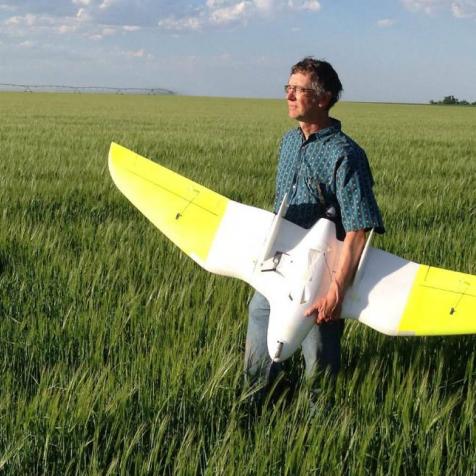
Company Details
Location
Boulder, Colorado
Founded
2013
Ownership Type
Private
Employees
15
Products
Drones for Agriculture
Boulder, Colorado
Founded: 2013
Privately owned
Employees: 15
Founder and CEO Tom McKinnon has positioned the agricultural drone maker for lofty growth as UAV applications explode.
In spring 2013, the Denver Zoo approached InventWorks, McKinnon's contract engineering venture, and asked for help radio-tagging vultures in Mongolia.
The concept -- dropping nets on the birds with quadcopter unmanned aerial vehicles (UAVs) -- didn't work, but it did show off the drones' potential.
"We asked, 'How do we monetize this?'" says McKinnon. The team discussed firefighting and search-and-rescue applications, but landed on ag as the target market with the most potential.
The company's first UAV took off in early 2014 to survey citrus orchards in California, but corn soon emerged as the top crop for the technology.
There are now about 30 Agribotix UAVs in the hands of customers in the U.S., Sweden, Australia, Africa, and elsewhere. The units start at $6,600 for a turnkey quadcopter or fixed-wing system.

Each drone is assembled and tested in Boulder. Agribotix sources parts from domestic and overseas suppliers and works with a local CNC operation to cut the frames.
The agricultural uses are many. "It's like peeling an onion," says McKinnon. A source of a low-cost aerial image led to infrared photography that identifies areas of stress and water needs and high-resolution imagery. "We can count the number of cornstalks," he touts.
Agribotix has developed machine vision that allows growers to take precision agriculture to the next level. By directing midseason fertilizer with UAVs, corn growers can boost yields by five to 10 bushels an acre. Noting that 200 bushels per acre is a target, McKinnon says, "That's a big deal."
"It's like going to Vegas," McKinnon says of farming. "They're making huge bets on fertilizer and this and that early in the season, commodity prices go up and down, and weather goes up and down."
The Federal Aviation Administration (FAA) currently bans on commercial drone flight in U.S. airspace, but the agency has approved about 300 exemptions for UAV commercial operators, including a recent exemption for a Yamaha-made unmanned cropduster that's big in Japan. "Up until a few weeks ago, I would say the FAA would never approve that, but the FAA just approved that," says McKinnon.

Agribotix has applied for an exemption. "It's a very tedious and expensive process," says McKinnon, citing the need for a UAV certification that's several steps below a pilot's license.
"It's gone into the legislative sausage-making process," says McKinnon. "When it comes out the other side, we think it will be exactly what we need. The future looks bright."
It likely won't be until 2017 that new rules will go into effect, he adds. He labels the bureaucracy as "an annoyance," not a roadblock, because there is light at the end of the tunnel.
Regardless, demand is high. "We're shipping quadcopters as fast as we can build them," says McKinnon. The business model melds manufacturing and software development, he adds. "We're mainly a software company. That's where the value-add is."
To this end, Agribotix offers a software as a service (SaaS) product that utilizes the company's algorithms and analytics, but not its UAVs. "It's our 'bring your own drone' service," says McKinnon.

Challenges: "This industry's exploding," says McKinnon. "We're one of the top three companies in this field in the world. How do we keep innovating and stay ahead of our competitors?"
Opportunities: Soybeans, palm oil, and grapes are target crops, as are potatoes. "We're really jonesing to get down to the San Luis Valley," says McKinnon, noting that Agribotix UAVs can add precision to the application of expensive fungicides. "Potatoes are a high-value crop, a lot more than corn or wheat."
International sales are another opportunity. "We get a lot of inbound interest from all over," says McKinnon, highlighting Latin America. "We're bulking out our sales there."
Needs: "The need is capital," says McKinnon. "We can't grow organically fast enough to stay viable. We're making revenue, but if we just feed off of that, we'd be left in the dust."
The company's founders funded the company's launch and have since raised $1 million in seed funding and grants, and McKinnon says a Series A round is next. "We haven't set the date and we haven't set an amount," he notes.
